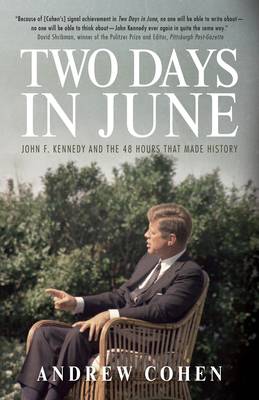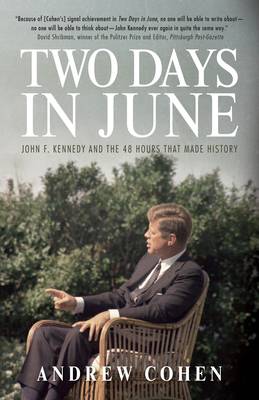
- Afhalen na 1 uur in een winkel met voorraad
- Gratis thuislevering in België vanaf € 30
- Ruim aanbod met 7 miljoen producten
- Afhalen na 1 uur in een winkel met voorraad
- Gratis thuislevering in België vanaf € 30
- Ruim aanbod met 7 miljoen producten
Zoeken
€ 22,95
+ 45 punten
Omschrijving
On two consecutive days in June 1963, in two lyrical speeches, John F. Kennedy pivots dramatically and boldly on the two greatest issues of his time: nuclear arms and civil rights. In language unheard in lily white, Cold War America, he appeals to Americans to see both the Russians and the "Negroes" as human beings. His speech on June 10 leads to the Limited Nuclear Test Ban Treaty of 1963; his speech on June 11 to the Civil Rights Act of 1964.
Based on new material--hours of recently uncovered documentary film shot in the White House and the Justice Department, fresh interviews, and a rediscovered draft speech--Two Days in June captures Kennedy at the high noon of his presidency in startling, granular detail which biographer Sally Bedell Smith calls "a seamless and riveting narrative, beautifully written, weaving together the consequential and the quotidian, with verve and authority." Moment by moment, JFK's feverish forty-eight hours unspools in cinematic clarity as he addresses "peace and freedom." In the tick-tock of the American presidency, we see Kennedy facing down George Wallace over the integration of the University of Alabama, talking obsessively about sex and politics at a dinner party in Georgetown, recoiling at a newspaper photograph of a burning monk in Saigon, planning a secret diplomatic mission to Indonesia, and reeling from the midnight murder of Medgar Evers. There were 1,036 days in the presidency of John F. Kennedy. This is the story of two of them.Specificaties
Betrokkenen
- Auteur(s):
- Uitgeverij:
Inhoud
- Aantal bladzijden:
- 416
- Taal:
- Engels
Eigenschappen
- Productcode (EAN):
- 9780771023897
- Verschijningsdatum:
- 3/05/2016
- Uitvoering:
- Paperback
- Formaat:
- Trade paperback (VS)
- Afmetingen:
- 132 mm x 203 mm
- Gewicht:
- 272 g

Alleen bij Standaard Boekhandel
+ 45 punten op je klantenkaart van Standaard Boekhandel
Beoordelingen
We publiceren alleen reviews die voldoen aan de voorwaarden voor reviews. Bekijk onze voorwaarden voor reviews.








